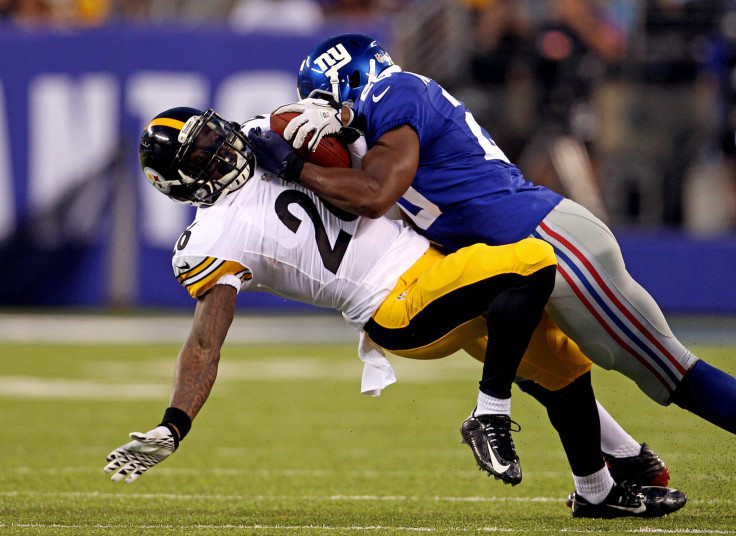Prince Amukamara Loses Virginity, Plays Better, But Does Sex Really Affect Athletic Performance?

New York Giants safety Antrel Rolle said his teammate, fourth-year cornerback Prince Amukamara, is having his best season as an NFL pro because he had sex for the first time this offseason. But historically, experts and top coaches have disagreed on whether performance in the bedroom has a positive or negative effect on performance on the field.
“There are a lot of things different about Prince,” Rolle told reporters Thursday, according to NJ.com. “For one, he’s married, so he’s [having sex]. For a man, that could definitely help him out. For a man … I’m just being honest … it’s helping him out. He walks around with a little more swagger, which is something that we need, which is something that we love.”
A devout Christian, Amukamara abstained from sex until his marriage to wife Pilar Davis earlier this year. As he left the practice field Thursday, the 25-year-old preempted media questions by announcing “yeah, yeah, I’m getting laid” to the throng of reporters on the sideline, the New York Daily News reports.
Amukamara laughed off Rolle’s theory, but some experts believe that sex really can boost a player’s performance on game day. “Sex tends to boost testosterone, which is what you’d want [as an] athlete,” Dr. Pamela M. Peeke, a spokeswoman for the American College of Sports Medicine, told Details magazine in August.
Emmanuele A. Jannini, a professor of endocrinology at the University of L’Aquila in Italy, came to a similar conclusion, according to National Geographic. In fact, Jannini found that men who abstained from sex for an extended period experienced a marked decrease in testosterone production. “After three months without sex, which is not so uncommon for some athletes, testosterone dramatically drops to levels close to children’s levels,” he said.
But many sports personalities, from days of athletic yore to the present, have asserted that sex “weakens” athletes by sapping them of their aggression, or prevents them from getting enough sleep the night before a game. The belief is particularly prevalent among boxers – the great Muhammad Ali reportedly refused to have sex for six weeks before a match. Freddie Roach, trainer to prolific fighters Manny Pacquiao and Miguel Cotto, tells his fighters not to have sex for 10 days before their bouts.
Sexual abstinence was a major theme at the 2014 World Cup. No fewer than nine countries enacted some sort of policy that restricted their players’ sexual activity out of fear that too much sex would cause their play to suffer.
Science has yet to produce conclusive evidence for either school of thought, but a 2013 review of 31 studies found little evidence that athletes who abstained from sex scored better on strength or endurance tests compared with those who engaged in sex. Similarly, a 1995 study published in the Journal of Sports Medicine and Physical Fitness found the physical output of 11 male subjects did not differ based on recent sexual activity.
So, Amukamara’s sex life may or may not be the catalyst for his improved play in 2014, don’t expect the Giants coaching staff to lay down a World Cup-style ban on him anytime soon.
© Copyright IBTimes 2024. All rights reserved.












